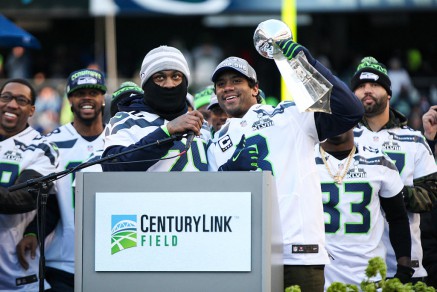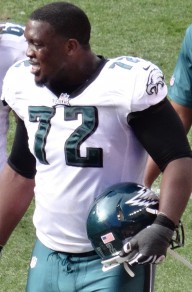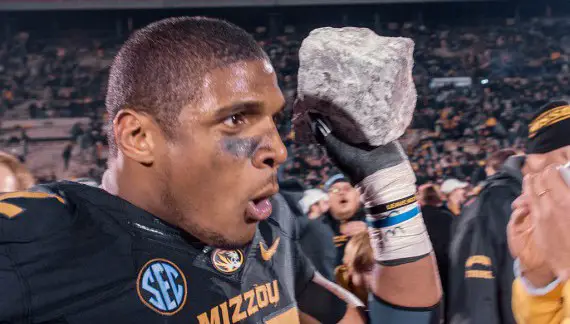If you read or listen to or watch any kind of sports media, you’ve heard more about Michael Sam this past week than even the Winter Olympics. Yes, it’s a big deal, Michael Sam coming out as the first openly gay major-level football player, and all the discussion is an important part of digesting this big step forward.
His timing was also perfect for launching heated discussions since every NFL fan is bored silly and most are still a bit riled up about their non-Seahawk team not winning the Super Bowl. Seattle fans are like, “Go gay dude! We have legal weed too, you should totally move here. We’re cool.”
In fact, Sam is very much like many of the draft picks and undrafted free agents that Seattle used to build their championship squad: high motor, hard-working, smart and a bit discounted in the football marketplace for one reason or another. They did not win a championship by trading up for a Heisman Trophy winner or two — QB Russell Wilson was an undersized, 3rd-round pick – No. 75 overall (13 picks ahead of fellow Pro Bowler Nick Foles).
Chip Kelly and the Philadelphia Eagles are pursuing a personnel strategy similar to Seattle’s: focus on athleticism and talent, assume you can improve players through coaching better than most teams and offer a young, fun team with a record of success to make players want to join you (especially during free agency).
A big part of that is looking for bargains, players whose potential you can see better than others. When a highly successful college player is being discounted for unimportant reasons, he’s a natural target.

A Seattle type of player?
At first glance, Michael Sam seems perfect for Philadelphia. Many writers identify the lack of a dominant pass rush as the Birds’ biggest weakness, and that is Sam’s strength. He had 11.5 sacks in the nation’s toughest conference, which some consider the NFL’s minor league. Part of the effectiveness of his pass rush is due to his raw speed, which Chip Kelly, of course, loves.
Sam has a proven record of success at the highest level, something else Kelly values highly. He was the SEC Defensive Player of the Year and a consensus All-American. His Missouri Tigers were the biggest surprise success of the college football season, winning the SEC East division and playing No. 2 Auburn very tough in the SEC Championship game.
And Chip is the innovative, open-minded guy who preaches “science over tradition,” so it’s not likely a player being gay is going to rattle him. He was thrown a much more divisive player controversy just months into his first NFL job, when Riley Cooper was caught on videotape making racist slurs (and worse, attending a Kenny Chesney concert), and Kelly found a way to heal that rift in what could have been a racially polarized locker room.
The Eagles also weathered the Michael Vick dogfighting controversy, so they are pretty good at dealing with media scrutiny by this point. Having the first openly gay NFL player on their team would be a slow day at the office after those two controversies.
So there you have it — Sam is the perfect answer for Philadelphia, right? Well, not so fast. First of all, he just doesn’t have a body that fits current NFL positions. Neither does Russell Wilson, but a quarterback who runs freely in space has more opportunity to compensate with personal skill than someone on the defensive line, smashing against the game’s biggest players.
Michael Sam is 6-foot-2 and 265 pounds — exactly my height with 100 extra pounds of raw muscle added — so he’s not exactly skinny, but he is not big enough to play defensive end in the Eagles’ 3-4 defense. In this scheme, the DE’s main job is to stop the run and occupy one or two OL blockers, freeing up the linebackers to make plays either rushing or in pass coverage.

Cedric Thornton
The Birds’ current starting DEs are Fletcher Cox (6-foot-4, 298 pounds) and Cedric Thornton (6-foot-4, 309 pounds). They’re young (both 25) and excellent fits, two of the most solid players on the team. Their backups are Clifton Geathers (6-foot-8, 340 pounds) and Vinny Curry, the smallest of the group (6-foot-3, 279 pounds), but a proven playmaker who had four sacks in limited time last year.
On passing downs they often go to a modified 4-3 defense, where Sam might come up to the line, but that’s Curry’s specialty, and and linebacker Brandon Graham also takes some of those snaps. It would be tough for Sam to budge any of those four.
Furthermore, Sam is not that good at stopping the run, a strength of the Eagles last year, which would be his first responsibility if he were a DE for the Birds. Missouri lost the SEC championship game primarily because they could not stop Auburn’s pro-style running game, which picked up a ridiculous 545 yards and 7 touchdowns.
The other option would be to move him to outside linebacker, the position where the Eagles are especially eager to pick up a pass rusher. But Chip and defensive coordinator Billy Davis value unreadable defensive looks, where any of the various linebackers could rush or drop back into pass coverage. Otherwise, it’s too easy to scheme against the defense.
Unfortunately, Sam is also not good in pass coverage. He was featured in that role at the Senior Bowl, and Jimmy Kempski scouted him there. Here is Kempski’s impression:
“Sam lined him up both at DE and LB. He looked good as a pass rusher when he played DE, but looked lost in space as a LB. Sam’s best fit is probably as a situational pass rusher in a 4-3, and those guys can be valuable. However, the Eagles already have a 6’2, 260-ish pound 4-3 DE who can rush the passer, but struggles with everything else. His name is Brandon Graham.”
So yes, the Eagles desperately need a dominant pass rusher (and a couple of safeties) to pull their defense together, and Michael Sam is a great pass rusher — but probably not for Philadelphia.
Top Photo Public Domain
Related Articles:
Chip Kelly Update: Everything's Good Again ...
Chip Kelly Update: Wailing and Gnashing of Teeth
Shock and Awe -- The Oregon Ducks' Football Hangover Effect
Despite Lopsided Score, Georgia State "Never Stopped Believing"
Hope Springs Eternal for Ducks
Incompetent Pac-12 Officials: How Do You Miss ALL of THIS?
Mark Saltveit’s newest book is “Controlled Chaos: Chip Kelly’s Football Revolution” (Diversion Books, NY) has been recently released. He is the author of “The Tao of Chip Kelly” (2013) and writes on science, religion, wordplay and political scandals. He is also a standup comedian and the world palindrome champion.

